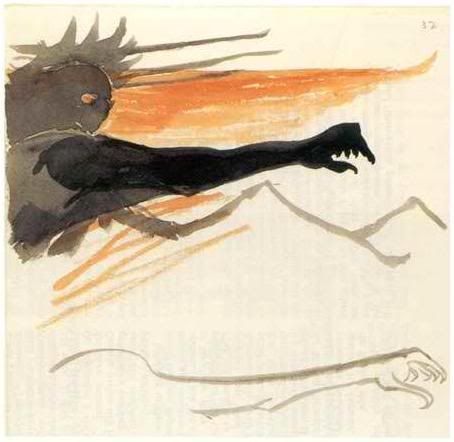
By the way: don't read this if you don't want the finale spoiled for you.
What I mean by the low return on emotional investment is: almost none of the characters show any real development in recompense for our attention and affection over the show's six-year run -- and by "development," I mean change for the better. Again, I'm not disappointed by this; it's one of the things that makes the show so fantastic. As consumers of a fictional story, we have been trained to expect the characters to grow, to improve, or to experience some sort of grand enlightenment as they traverse their precarious tight-ropes. In other words, they should have the proverbial "character arc," as Christopher Moltisanti pointed out to Paulie once upon a time (Chris was right, by the way -- he doesn't have one). With the exception of being slightly less of an asshole for a while after he's shot in the beginning of the sixth season, Tony is the same exact character in the final shot as he is in the series pilot. It's our own fault if we expect anything else -- we are dealing with (arguably sociopathic) criminals, after all.
With that in mind, I find it really ironic that everyone seems so concerned with "what happens" after the show's finale ends. On the one hand, I completely understand the feeling; we don't like not knowing. And, to be perfectly honest, we all develop an affection for Tony despite the fact that he's a murderer (even of friends and family), and so part of us hopes he can pull it together -- both out of genuine goodwill, and the expectation that he should, because this is fiction and that's what happens to the main character.
But there is no character arc, for anybody -- except perhaps pointing slightly downward. Our emotional attachment to Tony is always rewarded with more of the same (making it really easy, by the way, to empathize with many of the other characters on the show). He doesn't keep his end of the implicit bargain that is always present between the audience and the characters. Perhaps on some level, we feel guilty for liking a guy like Tony (and Chris and Sylvio and Paulie etc. etc.), and we want him to change for the better so we could genuinely like him if we knew him in real life.
But he doesn't, so what more can you really ask for in an ending? While briefly rising out of his coma after being shot, he asks Carmela, "Who am I? Where am I going?" The answer is either "nowhere" or "the same place you've always been going." If you think about people in your own life of whom the same is true, people who have had every opportunity to change and who have been repeatedly prodded by friends and family to improve themselves but refuse to do so every single time, eventually the only option is to just disconnect, for your own good.
And yet, a whole lot of viewers complained vehemently about the abruptness of the ending -- it wasn't enough, there were too many loose ends, we needed more of Tony and his mid-life crises and his seedy criminal predicaments. In a brilliantly ironic twist, The Sopranos puts viewers in the shoes of characters like Carmela and Tony Blundetto, who wanted to get away from Anthony Soprano but couldn't, and at the same time manages to get people craving what is so often leveled at TV shows as a criticism -- more of the same.
What I'm saying, basically, is that, right along with the baggage of obligatory affection for fictional "protagonists," I also don't feel like I have any real reason to care what happens to Tony after the screen goes black, whether in a long-term or immediate sense. Ambiguity is perfectly satisfying sometimes.
Other comments:
The tension between safety (family) and danger (the walking Michael Corleone reference) in the final scene is amazing, particularly because the only reason we get anxious while watching it is because we know it's the last episode, and, judging from the clock and the show's subtle cues, we know it's the last scene. If that same sequence had been in the middle of the episode, or a few shows back, it would've been just another dinner out for the Sopranos.
I love it when a movie or a TV show connects a song so strongly with a particular moment that I'll never think of one without thinking of the other again (i.e., "Don't Stop Believin'" by Journey). Other examples that come quickly to mind include "The Power of Love" by Huey Lewis and the News (Back to the Future), "Stuck in the Middle With You" by Stealers Wheel (Reservoir Dogs), and "The Times They Are A-Changin'" by Bob Dylan (Watchmen).
Also, "The Man in Me" by Dylan, in The Big Lebowski (twice!).

